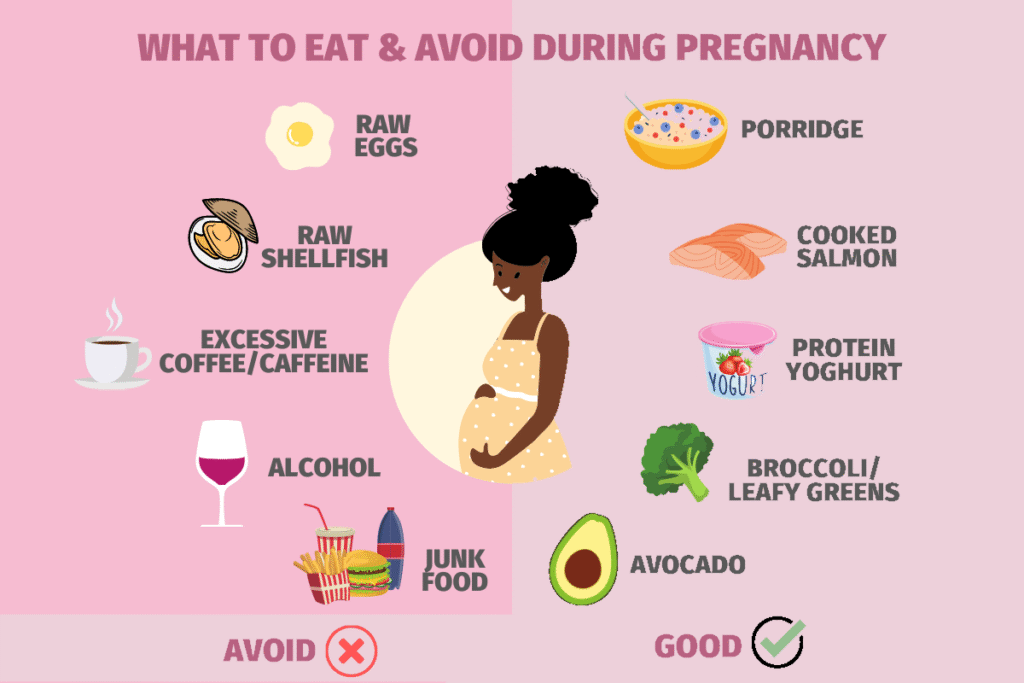During pregnancy, it’s essential to consume nutrient-dense foods that support fetal development while avoiding items that can pose risks to you or your baby’s health. A balanced diet rich in vitamins, protein, fiber, and healthy fats is crucial, while specific ingredients, bacteria-prone foods, and high-mercury fish must be strictly limited or avoided.
Best Foods to Eat During Pregnancy
- Well-Cooked Proteins:
Choose fully cooked meats, poultry, eggs, and fish. These provide iron, B12, and protein — essential for oxygen delivery and tissue growth. Avoid rare or raw options, which may harbor bacteria like Listeria or Salmonella. - Pasteurised Dairy:
Milk, yogurt, and cheese should always be pasteurised to avoid listeriosis. These are rich in calcium and vitamin D, which support the baby’s bones and teeth. - Legumes:
Beans, lentils, and chickpeas offer plant-based protein, folate, and iron — vital for preventing anemia and neural tube defects. - Fruits and Vegetables:
Always wash thoroughly before consumption to remove potential pesticide or bacterial residues. Avoid pre-packaged salads or cut fruit that may not have been cleaned adequately. Leafy greens and vitamin C-rich fruits support immune health and iron absorption. - Sweet Potatoes:
High in beta-carotene, which converts to vitamin A — important for cell growth and fetal organ development. Unlike liver (which can provide excess preformed vitamin A), sweet potatoes offer a safe plant-based source. - Avocados:
These are rich in folate, potassium, vitamin K, healthy fats, and antioxidants. They help with fetal brain development and may ease pregnancy cramps due to their potassium content. - Whole Grains:
Oats, quinoa, and brown rice provide fiber, B vitamins, and sustained energy — supporting digestion and reducing constipation.
Foods and Drinks to Avoid
- Raw or Undercooked Animal Products:
Skip sushi, rare steaks, soft-boiled eggs, and deli meats unless reheated. These can transmit harmful bacteria like E. coli, Listeria, and Toxoplasma. - Unpasteurised and Processed Foods:
Avoid raw milk, soft cheeses like brie or feta unless labeled pasteurised, and pre-made spreads or dressings that may contain raw eggs. - Alcohol:
No amount is safe. Fetal Alcohol Spectrum Disorders can affect a child for life — impairing brain and physical development. - Caffeine and Herbal Teas:
Limit caffeine to 200 mg/day (roughly one cup of coffee). Excess can reduce birth weight. Be cautious with herbal teas — many contain caffeine or compounds unsafe in pregnancy. - Sesame and Sesame Products:
Avoid due to potential Salmonella contamination in certain batches — especially in tahini or unregulated imports. - Pre-Prepared Produce:
Steer clear of bagged salads, cut fruits from buffets, or vending machines. These may not be washed adequately and can harbor listeria. - High-Mercury Fish:
Avoid swordfish, shark, king mackerel, and tilefish. These can harm your baby’s nervous system.
Deeper Insights Most Guides Miss
- Bone Broth & Collagen-Rich Foods:
These aid in joint flexibility, skin elasticity, and overall recovery during postpartum. A cup of homemade bone broth offers glycine and gelatin—often overlooked but crucial amino acids in pregnancy. - Choline (from eggs & liver):
Many prenatal vitamins don’t include adequate choline, which supports fetal brain development. Include whole eggs or small portions of well-cooked liver (rich in choline but high in vitamin A—limit to once a week). - Seaweed (in moderation):
Offers iodine, essential for thyroid health. However, excess iodine can cause problems, so limit servings and choose low-iodine types like nori. - Fermented Foods:
Natural probiotics from kimchi, sauerkraut, and kefir can help maintain a healthy gut microbiome, reduce nausea, and prevent constipation.
Hydration and Fluids
Drink 8–12 cups of water daily. Hydration aids in nutrient transport, supports amniotic fluid levels, and helps reduce swelling. Coconut water can help with electrolyte balance, while lemon water may ease nausea.
Final Tip
Always speak with your midwife or registered dietitian to tailor your diet to your specific health needs. Every pregnancy is different — what benefits one person may need modification for another.
Nikoletta Lis
Midwife, MPH, IBCLC
National Library of Medicine. Salmonella. Mother to baby. Organization of Teratology Information Specialists (OTIS) 1994.
Tam C., Erebara A., Einarson A. Food-borne illness during pregnancy. Can Fam Physician. 2010;56 :341–343.
Jha A., Ashokkumar K., Diapari M., et al. Genetic diversity of folate profiles in seeds of common bean, lentil, chickpea and pea. Journal of food composition and analysis. 2015;42:134-140.
Comerford K., Ayoob K., Murray R., Atkinson S. The role of avocados in maternal diets during the
periconceptional period, pregnancy, and lactation. Nutrients. 2016;8:313.
Jung S., Oh M., Park S., Chae S. Effects of rice- based and wheat-based diets on bowel movement in young Korean women with functional constipation. Eur J Clin Nutr. 2020; 74:1565-1575.
Vorgias D., Bynum F., Bernstein B. Fetal alcohol syndrome. StatsPearl publishing 2025.
Lakin H., Sheehan P., Soti V. Maternal caffeine consumption and its impact on the fetus: A review.
Cureus. 2023;15:e48266.
Coulombe G., Tamber S. Salmonella enterica outbreaks linked to the consumption of tahini and
tahini-based products. Microorganisms. 2022;10:2299.
Aakre I., Tveiti Evensen L., Kjellevold M., Dahl L. Iodine status and thyroid function in a group of
seaweed consumers in Norway. Nutrients. 2020;12:3483.
Dimidi E., Cox S., Rossi M., Whelan K. Femented foods: Definition and characteristics, impact on the
gut microbiota and effects on gastrointestinal health and disease. Nutrients. 2019;11:1806.
